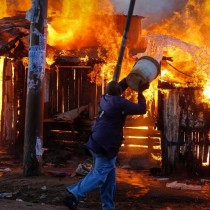
Violence Flares and Tensions Rise After Kenya Presidential Vote
Shops were burned Friday night in Kawangware, a neighborhood in central Nairobi, and a civil society group reported that six people had been injured, including three with machete wounds. The neighborhood is a stronghold of the opposition leader Raila Odinga, who withdrew from the presidential race two weeks before the second vote.
In western Kenya, where Mr. Odinga enjoys strong support, demonstrators clashed with the police. Six people were killed, 13 injured and 86 arrested in election-related unrest nationally, the police said late Friday.
Mr. Odinga lost to President Uhuru Kenyatta in the first vote, in August, but challenged the validity of the results. The Supreme Court, citing irregularities and possible hacking, called for a new election by the end of October.
But Mr. Odinga insisted that the same elections commission whose work was cast in doubt by the court couldn’t oversee a fair poll that quickly, and he withdrew. The day before the second vote, he urged his supporters to boycott.
Supporters seemed to heed his call on Thursday, when Kenyans went back to the polls. Local reporters across the country said it was difficult to find the long lines that had been a feature of the August poll.
Exact figures were still murky on Saturday, and official statistics were quickly politicized. Wafula Chebukati, the chairman of the elections commission, warned that he couldn’t guarantee a credible vote because of political interference. One of his commissioners, Roselyn Akombe, fled the country and resigned, citing threats against her, including from her fellow commissioners.
On election night, the commission announced a voter participation rate of 48 percent, even as official results were still coming in. The number raised eyebrows, especially in places where participation rates appeared to be in much lower.
The picture became even less clear on Friday morning, when Mr. Chebukati said the number of result sheets the commission had received from polling centers outstripped the number of polls that were open, by 1,205.
Andrew Limo, a spokesman for the elections commission, said the discrepancy was caused by a cellphone network problem and had no bearing on the process.
By Saturday afternoon, Mr. Kenyatta had officially received 3.7 million votes, or more than 98 percent of those the commission says were cast. Commission figures put participation at 46 percent.
Civil society groups painted a different picture. The coalition Kura Yangu, Sauti Yangu ("My Vote, My Voice”), which had deployed 2,000 polling observers across the country, estimated turnout at 38 percent based on a random sample of result forms it had collected. The group saw the highest turnout in Rift Valley, a Kenyatta stronghold where over 60 percent of voters turned out in some places, according to Maina Kiai, a human rights lawyer and one of the coalition leaders.
Confusion around the numbers has fed rumors among opposition supporters. Crowds of men in Kawangware on Saturday said the discrepancies made it impossible to trust the process or accept the outcome.
Anger and fear were palpable there, and crowds shouted "Uhuru must go!” at police vans. At one junction, where motorcycle taxi drivers sat idle and shops were shut, people insisted that the only acceptable outcome was an Odinga presidency.
Others seemed more fatigued than partisan. They said they did not support Mr. Kenyatta, but these past weeks had left them jaded.
"Politicians are like ghosts. Today they say one thing, tomorrow it’s something else. We don’t care what the outcome of all this is. We just want to see change,” said one man, Morris, who said he did not want to be identified by last name for fear of reprisal.
Some men here said language was being used as a proxy for political allegiance — Mr. Kenyatta has strong support among the Kikuyu ethnic community, and Mr. Odinga has the backing of Luos and other, smaller groups. Each ethnic group speaks its own language, making it easy to differentiate.
Security appeared to be the top concern for many. Most of the men on the streets on Saturday worried about a repeat of the violence from the previous night. This time, many said, they would not be caught off guard.
"We can have stones, we can have sticks, we can have pangas,” said another man, Lancaster, using the Swahili word for machete. He, too, insisted on using only his first name, fearing reprisal. "Whatever it takes to defend ourselves,” he said, "we will use.”
New York Times
Leave a comment
| Copyright © 2009 - 2024 Sunatimes News Agency All Rights Reserved. |
| Home | About Us | Diinta | Reports | Latest News | Featured Items | Articles | Suna Radio | Suna TV | Contact Us |
 0
0 









Violence Flares and Tensions Rise After Kenya Presidential Vote
NAIROBI — Tensions were on the rise in western Kenya and parts of Nairobi amid confusion and discrepancies surrounding the country's repeated presidential election this past week, with deadly violence breaking out in some areas.